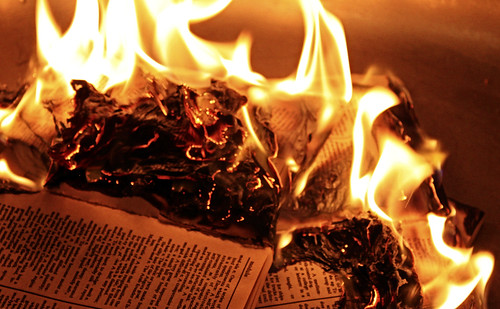Is there anything more disrespectful to a book–and its authors and would-be readers–than burning? Book burnings are inevitably associated with censorship and repressive ideology, from the Third Reich to the more recent Quran-burning controversy. Even without those connotations, burning any book–for any reason–sends a shiver down my spine.
But can book-burning sometimes be justified? On Cracked, S. Peter Davis writes about book-burnings that are occurring now, all over many countries–and why:
For the past year or so, part of my job has been to walk through library warehouses and destroy tens of thousands of often old and irreplaceable books. […]
Industrial-scale book destruction is going on at the British Library, possibly the most prestigious library in the world (you can tell because it’s British). Recent book-pulping scandals have hit the University of New South Wales in Australia, as well as several other institutions. Hell, when Borders bookstores went belly-up earlier this year, they decided to destroy all the unsold books instead of donate them.
And no, I’m not just talking about duplicates and old TV Guides, either. Imagine holding a beautiful, dusty, illustrated volume of Shakespeare printed in the 1700s, a calligraphic message from its long-dead owner inscribed on the inside cover, and throwing it straight in the trash. I’ve been there, more than once. I could have kept it and maybe gotten a few hundred dollars for it on eBay, if my supervisor wasn’t watching with specific orders to prevent me from doing that.
Before you write Davis any hate mail, read his entire piece. He offers six reasons these book-burnings occur, including “It’s cheaper than giving them away,” “Libraries can’t grow fast enough,” and yup, you guessed it, “The books are going digital.” In the end, Davis concludes that these book-burnings are inevitable in today’s world.
What do you think? Are book-burnings like this evil? A necessary evil? Or just… necessary?






